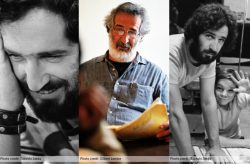National Film Board of Canada honours André Melançon’s outstanding contribution to Quebec cinema
PRESS RELEASE
24/08/2016

August 24, 2016 – Montreal – National Film Board of Canada (NFB)
The National Film Board of Canada (NFB) wishes to pay tribute to director, screenwriter and actor André Melançon, who died on August 23 at the age of 74. Melançon was born in Rouyn-Noranda in 1942 and trained in the field of psychoeducation. He went on to leave his mark on filmmaking in Quebec with his sensitive, accurate portrayals of childhood. During a career that spanned close to half a century, he wrote and directed more than 30 documentaries and dramas, including Les vrais perdants (NFB) and the highly popular La guerre des tuques (The Dog Who Stopped the War), in addition to acting in some 20 films.
“André Melançon had a special niche in Quebec cinema. In documentary as in fiction, his sincerity and unique sensibility brought together viewers of all ages around original narratives that closely reflected the concerns of young people. We are proud to feature some of his most important work in our collection,” said Claude Joli-Coeur, Government Film Commissioner and Chairperson of the NFB.
Quick Facts
André Melançon’s career
- In 1967, Melançon made his first film, Le camp de Boscoville, a documentary about the rehabilitation centre where he worked for five years. He joined the NFB in the early 1970s. There, he wrote and directed Des armes et les hommes (1973), a film about the fascination with firearms that skilfully combined fact and fiction.
- In 1974, based on a suggestion by NFB producer Jacques Bobet, he wrote and directed three fictional shorts for children: Le violon de Gaston (Gaston’s Recital), Les tacots (Soap-Box Derby) and “Les Oreilles” mène l’enquête. Made for the French second-language educational series Toulmonde parle français, the films were resoundingly successful. From then on, Melançon’s work addressed themes directly or obliquely related to childhood.
- In 1978, while still at the NFB, he made Les vrais perdants, a hard-hitting documentary questioning the attitude of parents who live out their own unrequited ambitions through their children. He then went outside the NFB to make the acclaimed feature drama Comme les six doigts de la main (1978) and two documentaries, La parole aux enfants (1980) and L’espace d’un été (1980).
- During the 1980s, he worked predominantly on the series Contes pour tous (Tales for All), produced by Rock Demers. The first work in the series, La guerre des tuques (The Dog Who Stopped the War), written by Roger Cantin and Danyèle Patenaude and released in 1984, marked an entire generation and remains his best-known work. He then made Bach et Bottine (Bach and Broccoli, 1986), which was equally a success. He also wrote the screenplay for Jean-Claude Lord’s La grenouille et la baleine (The Tadpole and the Whale, 1988) and directed Fierro, l’été des secrets (Summer of the Colt, 1989) while supervising the French dubbing of films in the series that had been shot in English.
- In 1991, he took a break from children’s cinema to direct Rafales, the story of an armed robbery that took place during a snowstorm. During this period, he worked mostly for television. Works he directed for the small screen include Nénette (1991), co-produced by the NFB, and two series, Cher Olivier (1997, whose screenplay he also wrote) and Ces enfants d’ailleurs II (1998), based on a novel by Arlette Cousture.
- In the 2000s, he returned to the theme of childhood. His interests included the troubled youth at the centre founded by Dr. Gilles Julien, whom he chronicled in his 2005 Sherpas Films/NFB documentary Printemps fragiles (The Bell Jar). His 2007 Sherpas Films/NFB film L’âge de passion (Youthful Passions), co-directed with Dany Croussette, revisited the now-adult children from his 1978 work Les vrais perdants.
- In 2013, he made the documentary Les trains de la vie (Trains of Life), which followed writer Kees Vanderheyden as he visited dozens of elementary schools to share his experience of war as a boy in his native Holland during the German occupation.
- In parallel to his work as director and screenwriter, Melançon pursued a career as an actor. In the 1970s, he gained notice in two films by Clément Perron produced at the NFB: Taureau (1973) and Partis pour la gloire (1975). In total, he performed in some 20 films. Melançon also had an abiding interest in theatre. For a number of years, he coached an improv team at the Ligue nationale d’improvisation (LNI). He also directed the teleplay Albertine en cinq temps (1999), based on the work by Michel Tremblay.
- Melançon received the Jutra-Hommage award in 2015, the Ordre national du Québec in 2013, and the Albert-Tessier award (the Quebec government’s most prestigious distinction in the field of cinema) in 2012.
–30–
Associated Links
Making Movie History: André Melançon. This interview is part of Making Movie History: A Portrait in 61 Parts.
Stay Connected
Online Screening Room: NFB.ca
Facebook: facebook.com/nfb.ca
Twitter: twitter.com/thenfb
Media Relations
-
About the NFB
For more than 80 years, the National Film Board of Canada (NFB) has produced, distributed and preserved those stories, which now form a vast audiovisual collection—an important part of our cultural heritage that represents all Canadians.
To tell these stories, the NFB works with filmmakers of all ages and backgrounds, from across the country. It harnesses their creativity to produce relevant and groundbreaking content for curious, engaged and diverse audiences. The NFB also collaborates with industry experts to foster innovation in every aspect of storytelling, from formats to distribution models.
Every year, another 50 or so powerful new animated and documentary films are added to the NFB’s extensive collection of more than 14,000 titles, half of which are available to watch for free on nfb.ca.
Through its mandate, its stature and its productions, the NFB contributes to Canada’s cultural identity and is helping to build the Canada of tomorrow.